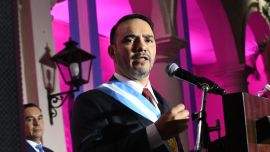Vice-President Cristina Fernández de Kirchner on Friday acknowledged tensions in the ruling coalition as she called on President Alberto Fernández to embrace conflict and take on business leaders.
Making a much-anticipated return to the political frontline – and appearing in public alongside the president for the first time in three months – Fernández de Kirchner delivered a speech that said politics and disputes were deeply entwined.
The former president, speaking at an event marking the 100th anniversary of the founding of state energy firm YPF, declared that it is impossible to “govern without conflict” in Argentina.
She suggested that any politician seeking an easier life should “apply for a post in Switzerland,” joking that there were “tensions and conflicts” even in the nation's cemeteries.
"To govern is to manage tensions and do so in favour of the great majorities,” declared Fernández de Kirchner, seated next to the head of state, with whom she had not spoken previously for a full three months, according to reports.
Reviewing what she viewed as the policy successes of 12 years of Kirchnerite rule in her address, the head of the Senate hinted that she and the president had spoken backstage prior to the event.
"We have to understand that decisions that favour great majorities always encounter many obstacles. But believe me, what we feel is pride in having returned YPF to the Argentines," said Fernández de Kirchner, referring to her 2012 decision to nationalise the state energy firm from Spanish firm Repsol.
"This is what politics is all about – not slogans and marketing," she added in a jab aimed at the opposition Juntos por el Cambio coalition.
‘Extraordinary tool’
Addressing the event celebrating the state energy firm’s centenary, Fernández praised YPF’s potential as an energy exporter at a time of global shortages.
"I celebrate that YPF is an extraordinary tool for economic policy in these times," said the president.
Fernández said that YPF's projections indicate that "by 2030 it will be possible to extract 140 million cubic metres of gas per day and up to 700,000 barrels of oil" thanks to exploitation of the Vaca Muerta shale formation, one of the largest unconventional reserves in the world.
"I see an extraordinary opportunity there," he said. "The world is going to demand from us what we have most: food and energy – we have to be prepared," said the president.
Fernández de Kirchner highlighted in her remarks that a major new piece of infrastructure work, named after her late husband, had been in part funded by a one-off levy on Argentina’s richest individuals.
The “Néstor Kirchner gas pipeline is made with 25 percent of the solidarity contribution" levy that was collected after the passage of law in Congress, she declared.
She warned, however, that Argentina’s hopes of becoming an energy producer would not resolve all the country’s economic problems.
"I say that the future is built in the present – the future is not built because we call for it verbally, but it is built every day,” she said.
“I have a great hope that Argentina will become an energy producer," though she warned: "Let's not believe that we are going to save ourselves because we have US$33 billion from Vaca Muerta."
‘Join forces’
Indirectly addressing tensions in the ruling coalition, Fernández called for all sectors of the ruling Frente de Todos coalition to “join forces” and put their differences over economic policy decisions to one side.
"We have to join forces, make ourselves strong, work in unity, those of us who feel a moral duty towards the most neglected," he said.
Prior to his remarks, Fernández de Kirchner had called on the president to “use the pen” and take on the sectors that “have to give things to the country.”
"I told you the other time, when I made a document, that you had the pen. What I am asking you to do is to use it, to use it with those who have to give things to the country, which does not mean fighting or anything else," said the former president.
The former head of state, who led Argentina from 2007 to 2015, said that "decisions that respond to the interests of the great majority of the population encounter many obstacles," but "in the face of adversity: pride and courage" were required.
She concluded: "If you want to govern Argentina without conflicts or tensions, I recommend that you run for the presidency of Switzerland."
– TIMES/AFP/NA

























Comments